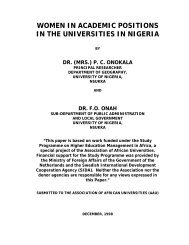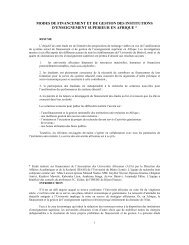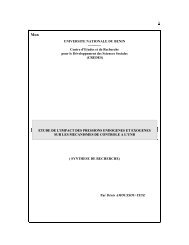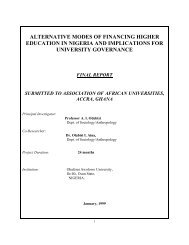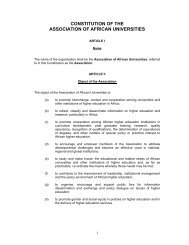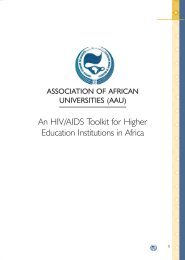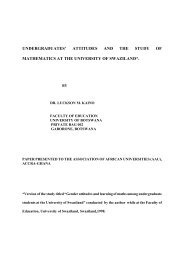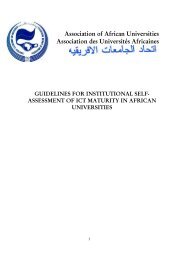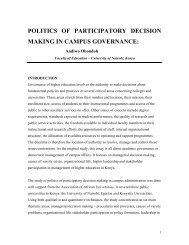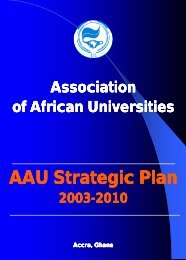governing teacher education colleges in south africa
governing teacher education colleges in south africa
governing teacher education colleges in south africa
You also want an ePaper? Increase the reach of your titles
YUMPU automatically turns print PDFs into web optimized ePapers that Google loves.
25<br />
(prov<strong>in</strong>cial matter) with its centralised style of governance.<br />
With the decision to <strong>in</strong>tegrate <strong>colleges</strong> of <strong>education</strong> <strong>in</strong>to higher <strong>education</strong>, these <strong>colleges</strong><br />
are faced with the challenge of develop<strong>in</strong>g themselves <strong>in</strong>to autonomous <strong>in</strong>stitutions<br />
responsible for their own academic and adm<strong>in</strong>istrative affairs with greater faculty<br />
participation <strong>in</strong> decision mak<strong>in</strong>g through faculty committees or senates. Despite the legacy<br />
of bureaucratic control and centralisation, <strong>colleges</strong> share a degree of scepticism towards<br />
immediate liberalisation and the grant<strong>in</strong>g of <strong>in</strong>stitutional autonomy. While they propose that<br />
<strong>teacher</strong> <strong>education</strong> <strong>colleges</strong> should be moved from prov<strong>in</strong>cial to national control to facilitate the<br />
process of <strong>in</strong>tegration <strong>in</strong>to higher <strong>education</strong>, they demand more responsibility and proactivity<br />
from central government <strong>in</strong> college affairs. This was justified by a generalised perception that<br />
with few exceptions, <strong>colleges</strong> lacked capacity to deal with issues that under normal<br />
circumstances an <strong>in</strong>stitution of higher <strong>education</strong> would have to address. The legacy of control<br />
and dependency on prov<strong>in</strong>cial government also seems to be a factor <strong>in</strong> this regard. One<br />
<strong>in</strong>terviewee put it as follows:<br />
I also th<strong>in</strong>k it's an issue of quality, if you want to really change someth<strong>in</strong>g, that<br />
change must be centralised. The implementation, the adm<strong>in</strong>istration of it could<br />
be localised, but government must be <strong>in</strong>volved. But I th<strong>in</strong>k at the level of ideas<br />
there needs to be some sort of central control. And aga<strong>in</strong> I th<strong>in</strong>k that it's not right<br />
to see central control as necessarily undemocratic; whether it is democratic or<br />
undemocratic depends on the structures that you put <strong>in</strong> place.<br />
Dur<strong>in</strong>g workshops held with all stakeholders on norms and standards, the read<strong>in</strong>ess and<br />
preparedness of <strong>teacher</strong> <strong>education</strong> <strong>colleges</strong> to enter higher <strong>education</strong> was very often<br />
questioned. While faculties of <strong>education</strong> wanted “to be left alone” <strong>in</strong> the runn<strong>in</strong>g of their affairs,<br />
<strong>colleges</strong> wanted a more prescriptive approach and demanded that the National Department of<br />
Education should set clear guidel<strong>in</strong>es and standardise procedures for deal<strong>in</strong>g with issues<br />
outl<strong>in</strong>ed above. 44 In one <strong>in</strong>stance, a participant <strong>in</strong>sisted that “National government should keep<br />
a check on how competent <strong>colleges</strong> are; what they are actually produc<strong>in</strong>g, and correct<br />
problems <strong>in</strong> the system.“<br />
This is <strong>in</strong> contrast with what is seen as the most important values that should underp<strong>in</strong><br />
college governance framework <strong>in</strong> the future. There is consensus on the pr<strong>in</strong>ciple that the<br />
policy process should be consultative and participatory. To facilitate this process <strong>in</strong> the<br />
college there should be a framework for <strong>in</strong>volvement of all stakeholders: “What we are say<strong>in</strong>g<br />
is that there should be a consultative process and … the consultative process should br<strong>in</strong>g <strong>in</strong><br />
the student sector, the parent sector, the community sectors so that the process that we are<br />
talk<strong>in</strong>g about ensures effective participation.” 45 Ngenya stressed that “the prov<strong>in</strong>cial<br />
44 Task Team on Norms and Standards, Summary Report of the Workshop held with <strong>teacher</strong><br />
<strong>education</strong> providers, Pretoria, SATI, March 1998.<br />
45 Haroon Mohamed, Interview, May 1998.<br />
25



